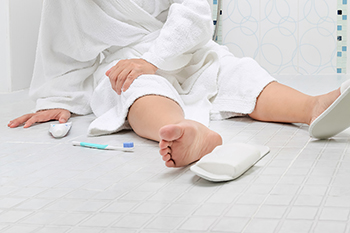Seniors and Falls
Tuesday, 17 May 2022 00:00
Everyone can stumble but older people have a higher propensity to falling. In fact, one in four seniors fall each year and the chances of falling double after falling once. Falls can be serious and cause broken bones or a head injury. They can greatly interfere with one’s ability to function and do so independently. Even if a fall is avoided, an older person can become fearful of falls and limit their participation in daily activities. This can further lead to weakness and increased chances of falling. Physical conditions that can make one more prone to falling include lower body weakness, vitamin D deficiency, difficulty with walking or balance, use of certain medications, vision problems, and foot pain. Other issues that lead to a greater risk of falls are poorly fitting footwear or home hazards, such as broken or uneven steps or throw rugs that can be tripped over. Tending to physical and other conditions, getting regular strength and balance exercise, and seeing a podiatrist for evaluation of risk for falling can help as well. As one ages, regular visits to a podiatrist are encouraged as a preventative health measure.
Preventing falls among the elderly is very important. If you are older and have fallen or fear that you are prone to falling, consult with Dr. Anna Petrov from Family Foot & Ankle Care. Our doctor will assess your condition and provide you with quality advice and care.
Every 11 seconds, an elderly American is being treated in an emergency room for a fall related injury. Falls are the leading cause of head and hip injuries for those 65 and older. Due to decreases in strength, balance, senses, and lack of awareness, elderly persons are very susceptible to falling. Thankfully, there are a number of things older persons can do to prevent falls.
How to Prevent Falls
Some effective methods that older persons can do to prevent falls include:
- Enrolling in strength and balance exercise program to increase balance and strength
- Periodically having your sight and hearing checked
- Discuss any medications you have with a doctor to see if it increases the risk of falling
- Clearing the house of falling hazards and installing devices like grab bars and railings
- Utilizing a walker or cane
- Wearing shoes that provide good support and cushioning
- Talking to family members about falling and increasing awareness
Falling can be a traumatic and embarrassing experience for elderly persons; this can make them less willing to leave the house, and less willing to talk to someone about their fears of falling. Doing such things, however, will increase the likelihood of tripping or losing one’s balance. Knowing the causes of falling and how to prevent them is the best way to mitigate the risk of serious injury.
If you have any questions, please feel free to contact one of our offices located in Wheeling and Chicago, IL . We offer the newest diagnostic and treatment technologies for all your foot care needs.







